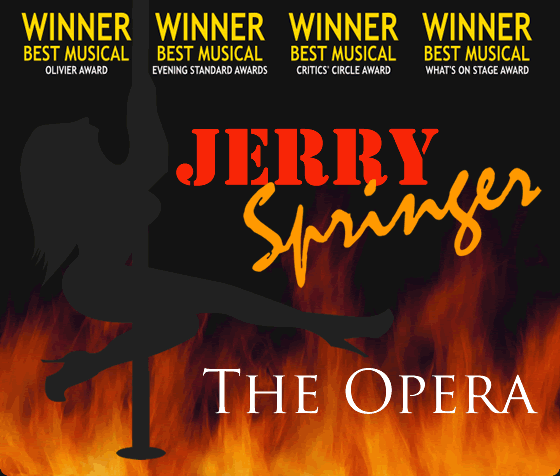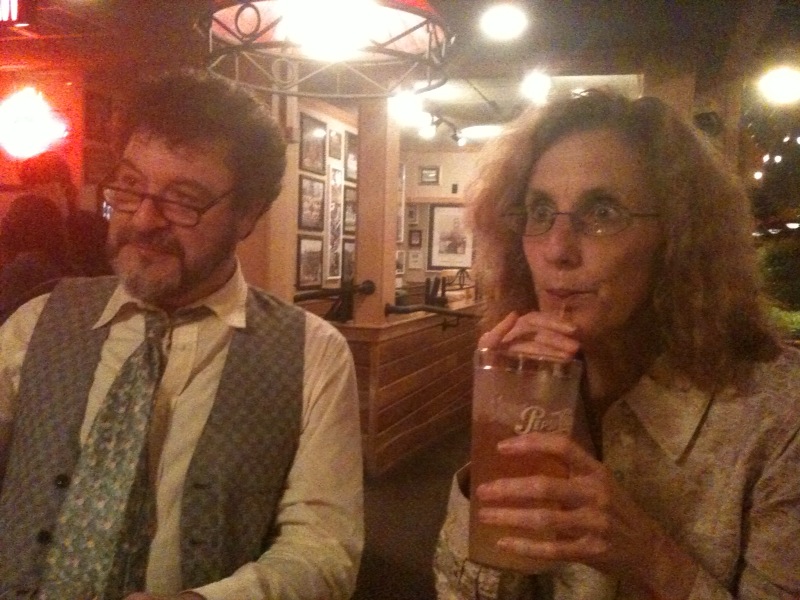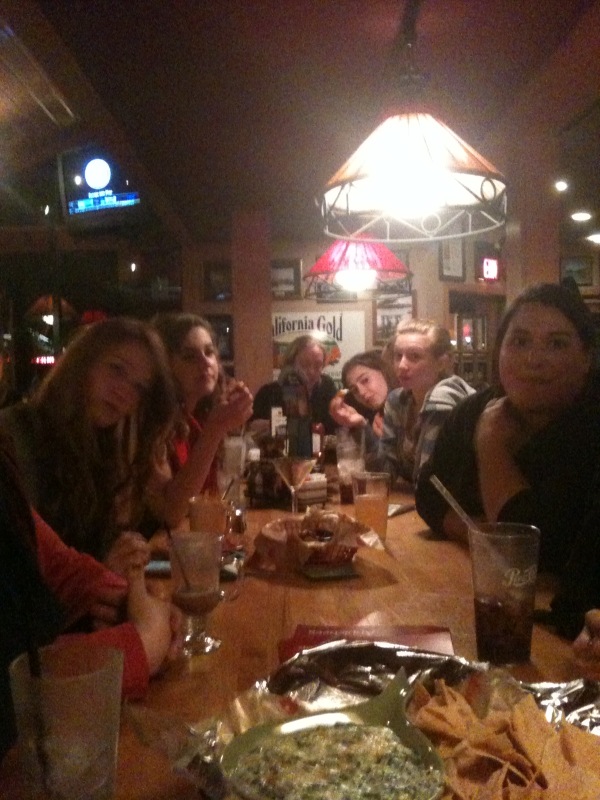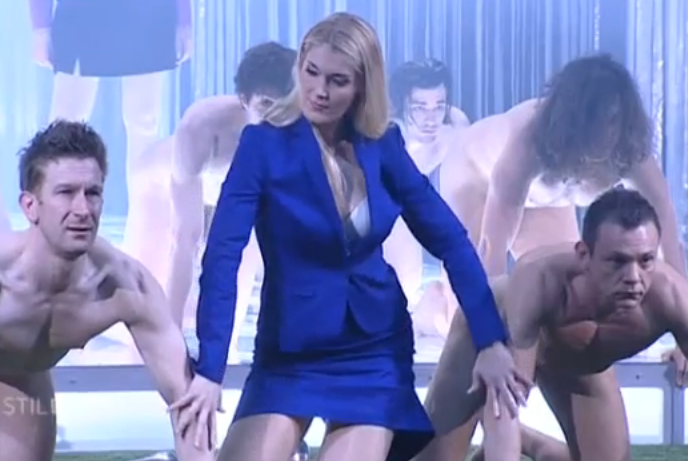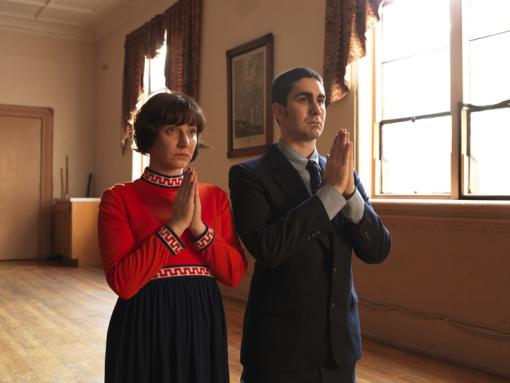
Please. Please please please. PLEASE!
As reported a few months ago, Richard Foreman has left the building. To be precise, he’s left the performance space on the second floor of the St Marks Church in the Bowery. In his wake remains the Incubator Project, the spin off of his Ontological Hysteric theater, dedicated to fostering works from emerging experimental theater artists.
This year is the Incubator’s first full post-Foreman season and the summer kicked off with a charming, if somewhat slight exploration of the tension between religious abstinence and post-adolescent sexuality via a poppy, toe-tapping two person opera, The Little Death Vol. 1.
The tone is set as soon as the doors open, the two performers (composer Matt Marks and collaborator Mellissa Hughes) greet the audience from behind a table, bright eyed, earnest, and wholesome, offering homemade chocolate chip cookies and lemonade (and copies of the CD).
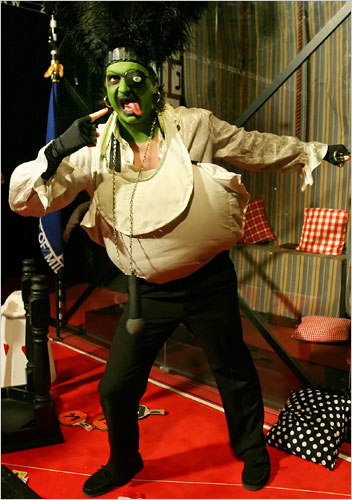
He was right THERE!
The walls are painted a garish yellow, the brightly lit space transformed into some rec room or middle school gymnasium. (I had never before seen the space without any scrims or curtains. It was disorienting. Ghosts of Foreman productions past seemed to haunt the room. “Last time I was here, there was a padded, one eyed green thrash-spewing demon pacing about right THERE.”)
We were all encouraged to put our names on the complementary nametags and watch for the step as we took our seats. It was all very quaint and sweet and strangely out of place, ironic, considering that the space really is a church.
What follows feels less like an opera than a somewhat staged concert presentation of a series of songs. The songs themselves are infectious concoctions, part Lemon Jelly, part Aphex Twin, part Michael W Smith with gestures to a panoply of other styles. The lyrics are minimal, songs rarely consist of more than two or three phrases, first repeated by one character, and then the other. The entire libretto consists of maybe twenty distinct sentences. The characters are drawn in the broadest of strokes, with almost no distinguishing personalities. He’s horny and a maybe a little religious. She’s religious and maybe a little horny. That dynamic remains fairly static throughout. Not much happens, no one really changes. It’s tough to get any drama or nuance out of material so slight and vague.
Yet despite the wisp of a plot involving a boy named Boy and a girl named Girl, the show is somehow still an awful lot of fun. Both Marks and Hughes are charming performers and the roles seem to have emerged from genuine aspects of themselves. Marks is affable and passively desperate. Hughes is positively aggressive in her refusal to submit to any sort of non church sanctioned pleasure. Add the never seen but often invoked Jesus, and they form their own trinity, a bizarre love triangle of repression, devotion, and lust.
But the music is the star of this show, the driving force, the thing that grabs your attention and makes you forgive the lack of… well… the lack of much of anything else. Having spent some time with the CD (I sprung for the “CD, Lemonade, and Two Cookies” package), it’s not clear that a staging really adds much. The tracks are all prerecorded, including overdubbed and altered versions of the performer’s voices for harmonies. (In the performance I saw, the live voices were too often lost in the mix.) And listening to an album doesn’t drag along the expectations of character development or narrative drive, both of which are in short supply.
So why not just leave it as an album? In retrospect a staging imposes cumbersome theatrical conventions and expectations on a perfectly good art/pop album. And if you’re looking for a wider audience, why not do what most good art/pop albums do? There’s a reason the Buggles didn’t write “Opera Killed the Radio Star”.
Ah… I see. They’re not dumb. They’ve got that angle covered too. They teamed up with the Brooklyn video collective Satan’s Pearl Horses and put together a video for their breakout single “I Don’t Have Any Fun”. And what do you know? It’s fun!
httpv://www.youtube.com/watch?v=QPbcoHNZ9s8
But doesn’t this sort of make a strong case that the song is not tightly melded to the staging? It’s a separate thing that can be adapted to multiple visual/theatrical contexts but not particularly rooted in any one? The songs are “formless” relative to the staging (as in the formless vs definite discussions from months ago). They can be translated from one visual realization to another. Some will be more effective, but there is a separability. Even theatrically, this narrative feels “formless”. With characters this broad and lyrics so sparse, the scene could be injected into just about any story that calls for a boy to want a girl who isn’t sure she wants him.
These aren’t criticisms as much as observations. It’s what the piece is. Right now. After all, it’s just volume 1. I expect that there’s more to the story. Some gaps that will get filled. Probably some more begging, some more praying, a bit more bleeding, and a lot more toe tapping. For now we’ve got an incomplete opera rooted in a contemporary popular idiom that doesn’t suck. And in my book, that is some very Good News.
